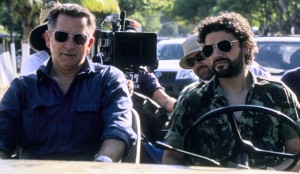Balibo: Timor finds a voice
 It’s been 34 years since the Indonesian invasion at Balibo when five Australian-based journalists went missing, and it’s now up to our filmmakers to make this story heard. Laine Lister reports.
It’s been 34 years since the Indonesian invasion at Balibo when five Australian-based journalists went missing, and it’s now up to our filmmakers to make this story heard. Laine Lister reports.
Less than 700 clicks off the coast of Darwin, Balibo director and writer Robert Connolly is uneasy.
He is visiting East Timor to screen his political thriller, which plots the modern history of the south-eastern Asian nation, to its president Jose Ramos-Horta.
“Can you imagine how nerve-wracking that was?” he bursts out laughing as he recalled his feelings at the time.
The Nobel Peace Prize recipient, and exiled spokesman for the East Timorese resistance during the years of the Indonesian occupation (1975-1999) took a keen interest in Connolly’s film from its inception.

